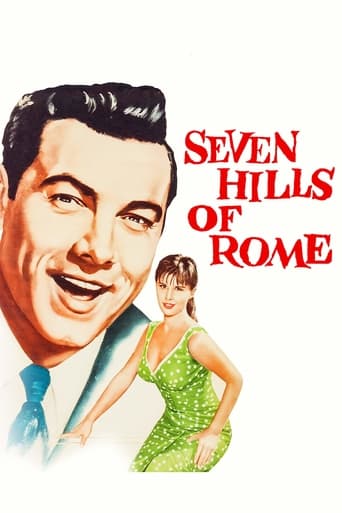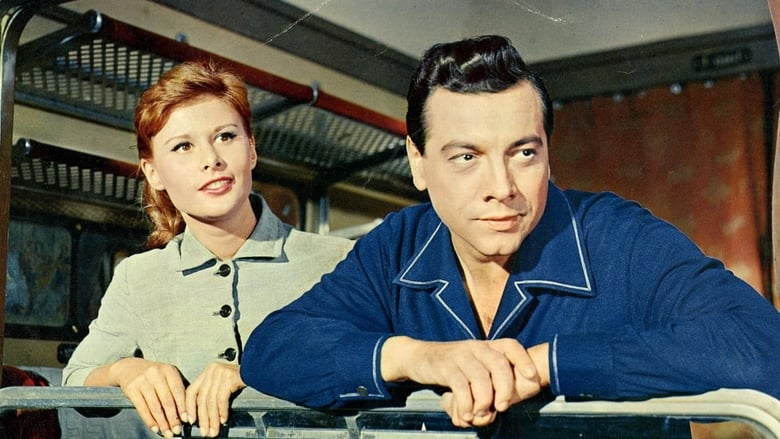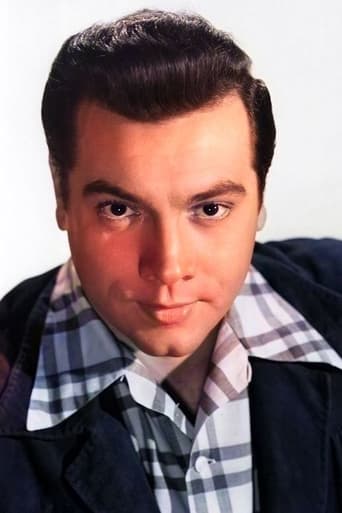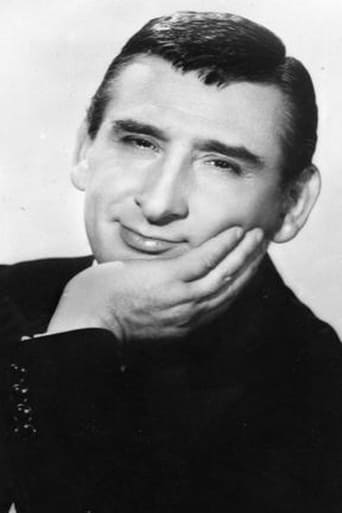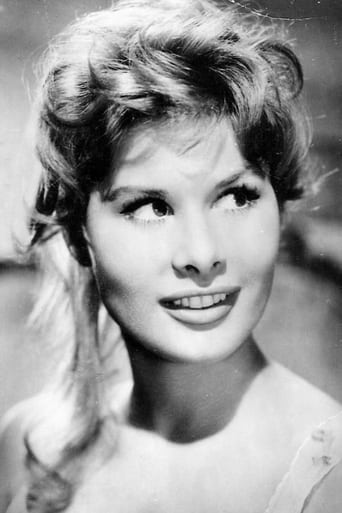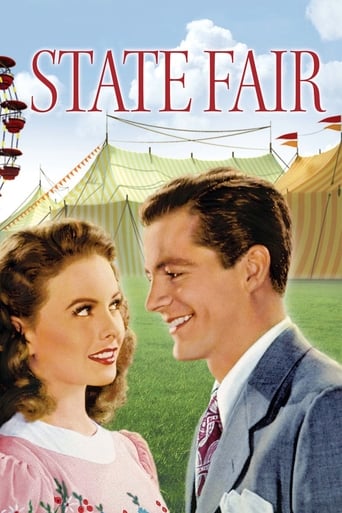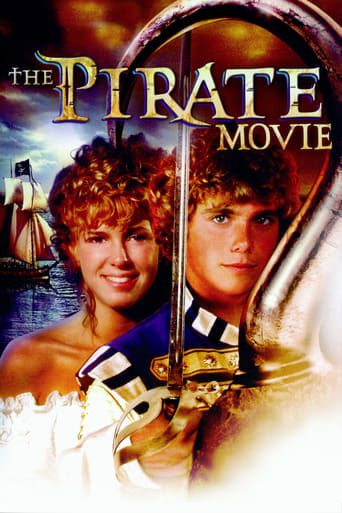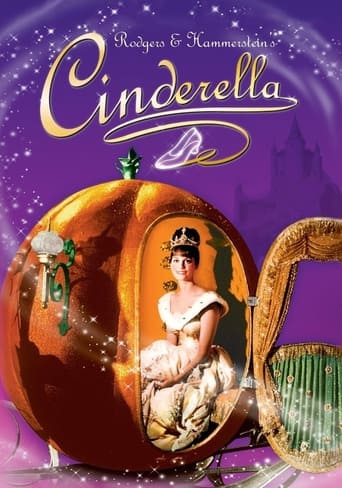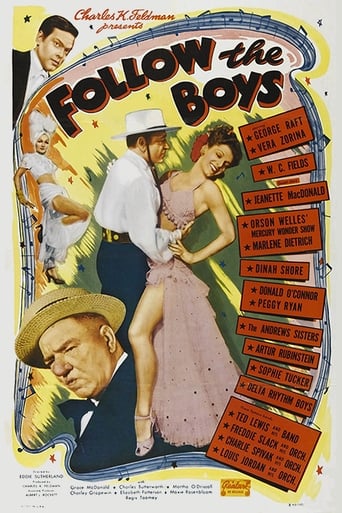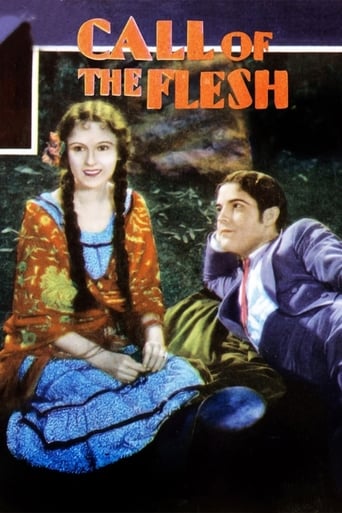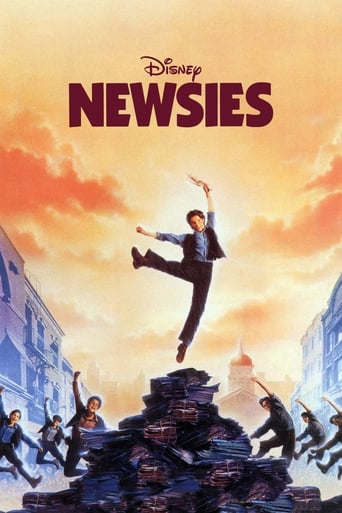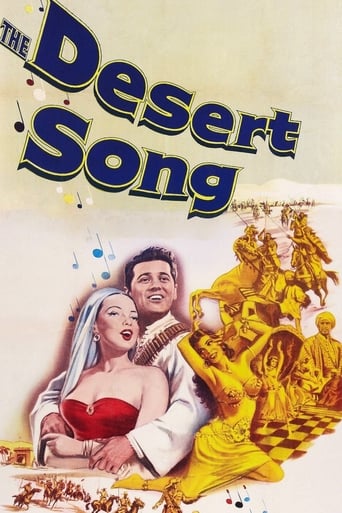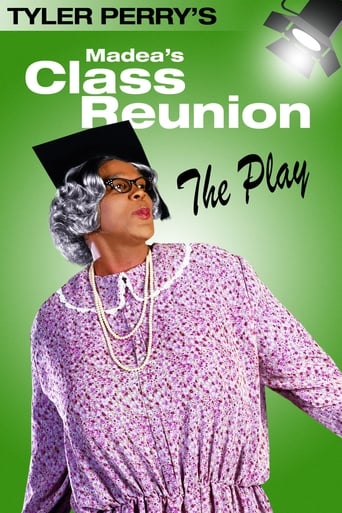Seven Hills of Rome (1958)
After having a fight with his girl friend, Marc follows her to Rome to try and win her back. On the train he meets a girl who is on her way to stay with her uncle. He gives her a lift to her uncle's, but they discover he has gone to South America. So as she has nowhere else to go, she stays with Marc and his cousin, which inevitably leads to romance.
Watch Trailer
Cast


Similar titles
Reviews
the audience applauded
It’s not bad or unwatchable but despite the amplitude of the spectacle, the end result is underwhelming.
Although I seem to have had higher expectations than I thought, the movie is super entertaining.
One of the worst ways to make a cult movie is to set out to make a cult movie.
Songs: "The Seven Hills of Rome" (Music by Victor Young, lyrics by Harold Adamson), "Calypso Italiano" (George Stoll), "M'Appari", "All the Things You Are", "Come Dance With Me", "Lolita", "Ay, Ay, Ay", "Loveliest Night of the Year", "Ti Voglio Benne Tanto Tanto", "Na Canzone Pe Fa Ammore", "Venticello di Roma", "E' Arrivato La Bufera", "Ostricaro Innamorato", "Vogliamaci Tanto Bene", "There's Gonna Be A Party Tonight", "Imitation Routine", and "Arrivederci Roma" (Renato Rascel, Carl Sigman), "Never Till Now" (John Green, Paul Francis Webster), "Earthbound" (Jack Taylor, Clive Richardson, Bob Muset), "Questa o Quella" (from Rigoletto by Giuseppe Verdi), "Temptation" (Arthur Freed, Nacio Herb Brown), "Jezebel" (Wayne Shanklin), "When the Saints Go Marching In" (traditional), "Memories Are Made of This" (Terry Gilkyson, Richard Dehr, Frank Miller).A Le Cloud Production. Distributor: Metro-Goldwyn-Mayer. Producer: Lester Welch. Filmed by Titanus S.P.A. at Titanus Studios in Rome. New York opening at the Radio City Music Hall: 30 January 1958 (ran 3 weeks). U.S. release: January 1958. U.K. release: 18 May 1958. Australian release: 16 June 1958. Sydney opening at the St James. 107 minutes. Cut to 104 minutes in Australia. 103 minutes in the U.K.SYNOPSIS: After losing his American TV show because of temperament, singer Marc Revere goes to Rome and his cousin Pepe's bohemian apartment. He is accompanied by Rafaella, a young Italian girl he met on the train after she had lost all her money. While Marc is singing in a fashionable night club, his erstwhile American fiancée Carol re-appears.COMMENT: "Seven Hills of Rome" looks a more attractive proposition on paper than it does in actual fact. Rome in Technirama and Technicolor is a rather drab affair. The actual locations look more like backdrops than real backgrounds.Lanza's singing? Well the songs by and large are not worthy of his talents and his series of imitations (Laine, Martin, Como, Armstrong) looks better than it actually sounds (oddly enough, the Armstrong "When the Saints Go Marching In" comes off best).Miss Allasio is only a moderately fetching heroine and as for Renato Rascel, minus his mustache and in a serious rather than a comic role, he just fails to make any impression. Is it his own voice? The direction, while it affords some scenic helicopter glimpses of Rome, is strictly functional. And as for the hokey plot, which comes on about ¾s of the way through with Miss Allasio lifting a bracelet, you can keep it. The Peggie Castle sub-plot is just as dull and clichéd but at least it enables a bit of glamour to sift across the screen — though Miss Castle is herself surprisingly bland and uninteresting in this effort. The direction is economy style, with Miss Allasio's fall in the rain obviously contrived.But for rabid Lanza fans for whom their idol can sing no wrong, he is looking good.
The "6" rating is only because Mario Lanza gets to sing a good number of worthwhile songs as only he can. But I could have done without his impersonation scene where he makes fun of popular Italian crooners like Perry Como and Dean Martin.The story is so flat and unconvincing that it's hardly worth a mention. It's sufficient to say that you can forget it while enjoying abundant glimpses of Rome's landmarks and terrain, all nicely photographed in Technicolor.Lanza was beginning to look heavier than usual but his voice is still able to belt out a mixture of operatic arias and pop tunes. The film itself is not an "essential," even for Lanza fans because the script is an uninspired bit of tedium. Just sit back and enjoy the scenery.
Mario Lanza is an American singer looking for his fiancé (Peggie Castle) in Rome in "Arrivederci Roma" aka "The Seven Hills of Rome." The threadbare plot consists of Lanza, as Marc Revere, meeting a destitute young woman, Raffaela (Marisa Allasio) on a train. He takes her to stay with his cousin Pepe. Pepe falls in love with her; she falls in love with Marc.The plot exists only to take the audience on a dazzling tour of Rome and to have an opportunity to listen to some beautiful music. This was the film that introduced the hit song "Arriverderci Roma." Lanza also sings "The Seven Hills of Rome," and part of "M'appari." Marc blunders into a talent show where his cousin is playing accompaniment and announces he will sing an aria from the opera "Rigoletto" and somehow Pepe knows it's "Quest o' quella" instead of the more famous "La Donna e Mobile." Probably the most entertaining scene is Lanza entertaining some young rock and rollers in Pepe's courtyard with imitations of Perry Como, Frankie Laine, Dean Martin, and Louis Armstrong.Having just heard Lanza do some of his best singing in "Because You're Mine," the change in the tenor's voice after six years of drinking was apparent, not to mention that he looked bloated. The voice had darkened; the top was sometimes strained, as well as the approach pushed, and some of the high notes had a covered sound. It's not unusual for a voice to change in this way - but not at the age of 37. However, he could still pull it out when he needed to, and often does throughout the film."Arrivederci Roma" is a pleasant film but heartbreaking to realize that Lanza is almost at the end of his downward spiral and that it would be stopped by his death. He was one of music's brightest lights.
(No spoilers in the first three paragraphs.) This film was released in 1958, and the next year Mario Lanza was dead. That is hard to fathom, seeing him so youthful and alive here. The story is simple - Marc Revere (Lanza, 36 during filming) is a well-known singer in the USA and engaged to pretty but difficult Carol. When she goes off to Europe, he sets out to find her, and things become interesting during his train ride to Rome. In the rain a pretty, young Italian, Rafaella (Marisa Allascio, 21 during filming), stumbles, falls, and gets on the train without a ticket. Marc, overhearing her argument with the conductor, offers to pay the 5,900 Lira for her ticket, allowed her to share his compartment, and even goes out the compartment for a minute so she could change into his dry coat.Marc has no apparent romantic attraction, although Rafaela is strikingly pretty. They ride together to Rome, she says she will pay him back after she meets with her uncle who is to help her find a job. The rest of the movie involve a couple of different love triangles, but mostly is a series of opportunities for Mario Lanza as Marc to sing, and beautifully he does. My favorite scene is where he sings for youngsters in the streets, doing his impersonations of Perry Como, Frankie Laine, Dean Martin, and Satchmo Armstrong. A nice little movie for anyone who enjoys Mario Lanza and his singing.As was often the case in the 1950s and 1960s, movies set in a foreign country contained liberal footage of the sights and sounds of the locale. Not so much to advance the plot, but I think more to serve as a 'travelogue' of sorts, back when fewer people traveled overseas and TV was not so world-wide. This movie includes much footage of Rome, its major attractions, and the surrounding countryside, filmed nicely in widescreen and color.SPOILERS follow, do not read further if you have not seen the movie, but please DO see it when you get the chance. When they arrive in Rome, Rafaela finds that her uncle has moved to Argentina, she has no job and no place to stay, so she and Marc end up staying with Marc's cousin Pepe (Renato Rascel). When Rafaela sees that Marc is not a cad, and is in fact a nice, talented singer, she begins to fall for him, even though Marc just treats her as a young lady working as cook and cleaning lady at Pepe's. Meanwhile, Pepe who becomes Marc's pianist, begins to fall for Rafaela, but she has no interest in him. Marc finally finds Carol in Rome, they renew their intent to get married, but she has another suitor chasing her. In the end it doesn't work out and, as Marc and Carol split, Rafaela is leaving for the train station, to leave Rome. Marc tracks her down and they end up hand in hand, walking in the evening light.The story uses the 'chance encounter' theme, if Rafaela had not been chasing that particular train, or if Marc had not been in that particular car, chances are they never would have met. Much of the middle of the movie is set up by Marc, Rafaela, and Pepe all being essentially 'broke', so they have to hustle odd jobs to buy food and avoid eviction. Marc's break in Rome comes when he stumbles into a local bad talent contest, wins easily, and gets hired for a regular singing job paying just over $5 American a day.

